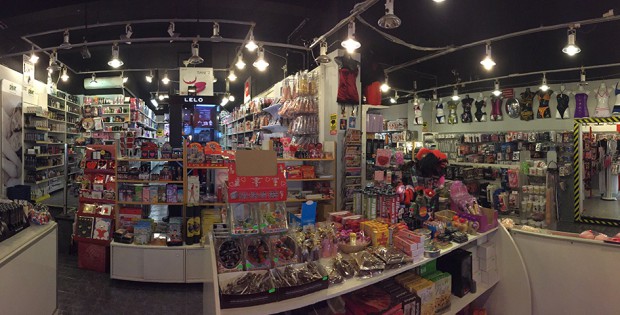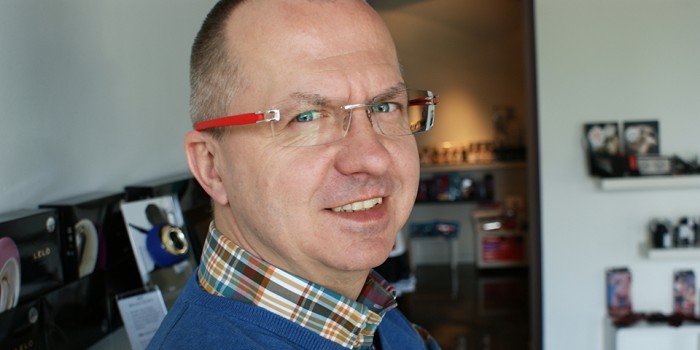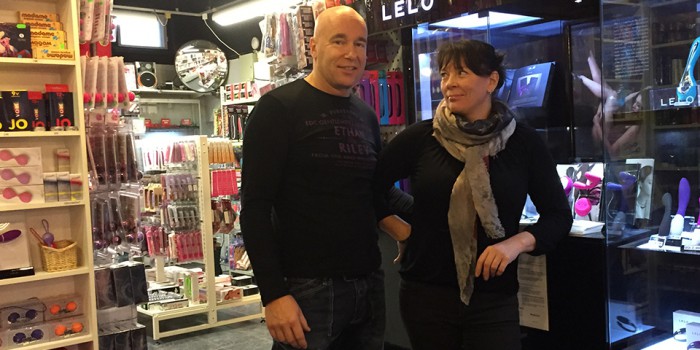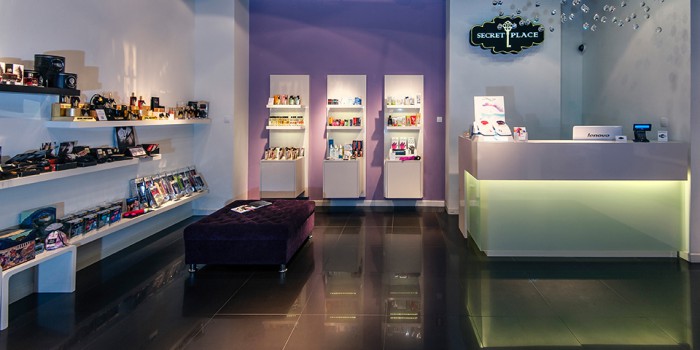
“Selling brands is simply more fun.”
Robert Strzelecki has two brick and mortar stores in Warsaw, while Tapio Ruppas runs a store in Jyväskylä, Finland. EAN invited them to a double interview and asked them how important brands are for their stores and for the market. Here is what they had to say.
The effectiveness of brands in the erotic retail trade is still up for discussion. Do you put emphasis on brands in your stores, and what are the reasons for your strategy?
Robert Strzelecki: In my opinion, every modern retailer who wishes to develop his or her business must have strong and recognisable brands. It is one of the essential preconditions for the growth of a store and its image. Sadly, I must admit that I know adult retail stores that are afraid of investing in branded goods. I know that everybody must make this strategic decision sooner or later.
Tapio Ruppa: There are a lot of good products which do not have a brand name at all. Other products have a good brand name. At the moment, both are selling well. Brand products are becoming more popular, especially if the products are in stock in a lot.
What are the advantages of selling brands?
Robert: There are a few. First of all, selling brands is simply more fun. It is satisfying. Especially since branded goods are much less defective and customers infrequently complain about them; they can see the considerable effort that went into both, the product itself and its packaging. Secondly, the combination of sales and strong brands has a great marketing effect. Customers just love branded products and consequently perceive your stores as an appealing and modern place. Thirdly, selling brands entails no substantial risk. Well, it is evident that first you have to invest in branded goods before you gain profits. Profit is a key word, and I assume that brick-and-mortar store owners know that they run their business to make money.
Tapio: Customers may have read or heard about a brand and already know something about it when entering the shop. A well-known brand name is easier to sell. The product offers better credibility. Often, the warranty helps to get things done more easily.

Brand sceptics often argue that the consumers can easily compare the prices of brand products on the internet, meaning they will likely turn to an online shop since those can afford to sell products cheaper than you could in a brick and mortar store. How much truth is in this argument, and wouldn’t that qualify as an argument against brands?
Robert: A modern 21st century store is not just a brick-and-mortar store. I am even tempted to say that a brick-and-mortar store is not enough if you wish to get ahead in this business. Nowadays, an online store is a must, and so it marketing support in social media and specific-subject blogs. I don’t know any good brick-and-mortar store that has no online counterpart. Thus, when consumers check the price, and they surely have a right to do so, they can buy a branded good anyway. I think that in the era of advanced technologies and modern production materials, there is still a large group of customers who choose to go to the brick-and-mortar store in order to experience things they purchase. Particularly because these are products intended for adults.
Tapio: On the internet, you can compare prices and get cheap copies, however, those are not the same products as the original branded products. You may be disappointed badly. I would argue that most of the brick and mortar stores have the same prices as the average online store. However, in the brick and mortar stores, you can be sure to get original brand products, and on top of that, you get great service and advice.
In order to steer clear of the price comparison problem, more and more retailers are selling private label products that you can’t buy anywhere else. What is your opinion on this development?
Robert: Each business model is fine, provided it is profitable and successful. Launching private label products is actually very easy. The question is, does it pay off? Private brand production is not just about getting a quality product, but above all, it is about concepts, ideas, things you sell, what the product looks like, what your consumers buy and certainly what else you offer in your store. It is also about a set of procedures and actions, for instance product returns and complaints. This is a complicated matter and we entrust it to those who know better. I must admit, however, that when we have two products on offer that are very similar, but they differ in terms of price and brand, the branded product tends to be the first choice.
Tapio: Everyone wants to stand out from the crowd. Your own brand cannot be bought elsewhere. But does that mean the customers are looking for it? If the product is unknown, it does not have the same value as the sales of a known brand. Creating a new brand takes a lot of time and money and copycats are always lurkig around the corner.

Are lots of people asking for specific brands when they visit your stores?
Robert: My partner and I have two brick-and-mortar stores in Warsaw (we intend to open other stores in other Polish cities as well) and when it comes to interest in specific brands, we cannot complain. Many consumers ask: “Do you have…?” and here goes the name of the brand. This proves that customers are loyal to brands. They make deliberate choices and believe in the quality a given brand represents.
Tapio: Yes. People read about various products and brands online, and depending on the level of interest in a brand, they will come to the store and want to see and feel the material and the motor power of the product, etc.
And who are these people asking for brands? Are most of them experienced customers, or are there also many newbies who already have a certain brand in mind?
Robert: A long time ago, it took much time to build a brand, years, decades even. Up to the present day, certain brands have prided themselves on the fact that they were founded in whatever year, that the Hall of Frame in their head office is full of portraits of presidents and inventors. In the arena of the internet, it is easy to promote a brand, and thanks to social media they can grow very quickly. Young customers in particular are conversant with brands and choose those they like the most. They grab their smartphones, click, and here you go. Then there is another group of customers, the experienced people who got into adult toys many years ago. They tend to refer to brands they like but are also willing to try brands that offer similar products. It is a small challenge, sort of a test. When they come back, they point out differences and similarities. It is a marvelous experience.
Tapio: Ha ha, bad question! Maybe there are people who spend a lot of time on the internet… There are also a lot of people who talk with friends about different products, and there are also the well-known names on their mind. All kinds of people are looking and asking for different brands.
“Creating a new brand takes a lot of time and money and copycats are always lurking around the corner.” – Tapio Ruppa
How can the sales staff in a store create awareness for brands when talking to and advising the customers?
Robert: We need to highlight that, sure, each storekeeper would like to sell the most expensive branded products, but a good store that cares about building relationships with customers never forces visitors or uses such tricks. It just doesn’t pay off. The best way of creating a good vibe and encouraging customers to buy a given brand is to instruct the sales personnel, teach them and increase their skills (selling techniques) that can come in handy when talking to the customers. Unfortunately, I cannot give details on what this training includes – but I can tell you that we pay much attention to sellers’ knowledge of the human anatomy and hygiene principles, and we place an emphasis on psychosexual health issues. Our sellers are personal advisors who are well- informed about intimate matters. They use this information in the process of advising the customers so that they can choose the product that is best for them.
Tapio: The seller can influence a lot. If it is a good brand or a good product, the seller is able to inform the customer of the product features.
Brands have been around for ages in other markets, but they have only recently started gaining real traction in the erotic market. Why did it take so long?
Robert: Perhaps it is because products for adults were traditionally perceived as non-luxurious products. They have never attracted people the way they do now. With the development of society and their growing awareness, people are getting interested in products that used to be sold illegally not so long ago. Now, these products not only represent top quality but are considered masterpieces. They are often prepared by groups of designers, IT specialists, doctors, image experts, etc. Today’s market offers adult product which rival cars in terms of price! And it’s just the beginning.
Tapio: The world is changing. Years before, sex was more hidden, there was no information available. Now, sexuality is liberated, and the erotic market is going mainstream. The internet is full of information, and brands can be presented a lot more prominently.
How do consumers respond to promotion/advertising campaigns, and do they have a real effect on the sales of the advertised brands or products?
Robert: I am sure everyone will answer differently because we live in various countries, we have customers of various experience levels and with different needs. I must admit however, that promotions assuring ready solutions do not work, e.g. “you have to buy this and that, and you will be happy”. Consumers are resistant to this sort of advertisement because they are everywhere, on the radio and TV, in the press, and in social media. What really works and attracts customers is contact with bloggers. We also keep blogs with the intention of promoting our brands. We opt for non-aggressive advertising.
Tapio: Advertising campaigns must be big and extensive if you want the brand to be memorable and stand out from the rest. Competition is fierce, advertising campaigns do not always reach out to all potential customers, and people do not immediately react to brand advertising.
“In my opinion, every modern retailer who wishes to develop his or her business must have strong and recognisable brands.” – Robert Strzelecki
What is the goal of these campaigns: to appeal new customers who have never entered your stores, or to create awareness for certain brands and products among your existing clientele?
Robert: Keeping blogs and encouraging people to purchase goods must be human-oriented. Advertisement and promotional campaigns are not human-oriented by nature. They are usually sophisticated and goal-oriented: “Buy this and that to get a discount”. We prefer adverts that focus on the human element and we can do so thanks to people who remark on products, who carry out tests, who prepare reviews. One photo taken in a natural environment (bed, kitchen, table in the living room) by a blogger is way more effective than a beautiful banner prepared by a group of marketing specialists in the head office of the company. I am surprised that companies are ready to spend thousands of euro for their banner adverts and forget about the human element of blogs.
Tapio: Both, of course. These campaigns have to get new customers interested and remind old customers to come to the store or online shop again.
Are such ad campaigns also a result of your commitment to brands, or put differently: Do brands have to be advertised in such a strong way to work?
Robert: Writing about products and brands on blogs is clearly more effective and that is why we have chosen to run product or brand campaigns this way. Thanks to this, we have won over wonderful customers who are aware of, and familiar with the brand, and wish to discover something new. But let’s face it – some manufacturers would like to have their own adverts in every post, every banner, every newsletter, and think that a flood of information is the best way of advertising. Well, our experience proves that things are otherwise.
Tapio: Any brand can create confidence, but I am not fully sold on that. There are also so many other good products and smaller brand names. The product itself has to sell well without the brand name.

How do you pick the brands for your stores? What do they have to offer? What makes a quality brand?
Robert: As far as our selection of brands is concerned, before we make a final decision, we need to analyse what this brand is, what it can offer, what added value there is. It sometimes takes a few weeks of online research, talks with partners, and testing demo products. We try to avoid brand competition and we aim at selling the best brands; we do not let manufacturers force us to pick up a specific brand or product just because they claim that they will surely be best-selling items. We provide verified, internationally recognisable brands that are known to create solid business. These are not ephemeras which vanish after a couple of months. It is perfect when these brands are created by companies that invest in brand growth, in new technologies and safety and offer much more. Long-term collaborations with numerous brands have taught us a lot, and so far, our choices have always been right. We highly value the smooth replacement of products that customers complain about and the quick delivery of new products. This process is smooth and fast, it often only takes 24 hours, and therefore, customers feel appreciated by us and by this specific brand. Of course, only strong brands can afford to implement such fast complaint procedures.
Tapio: I’m happy if brands are manufactured / produced in Europe or the US. On average, they have a better quality. Also, the wholesale / retail price must be right. Sometimes, the manufacturer wants maximum profits, and the retailer only gets small change for the sale. This equation is not good if you want a store to sell your product in the long term. The warranty should also work smoothly. And finally: The brand is relevant only if it is purchased. Products on shelves gathering dust aren’t beneficial to anybody.
(The top photo shows AntiShop in Jyväskylä, Finland)





